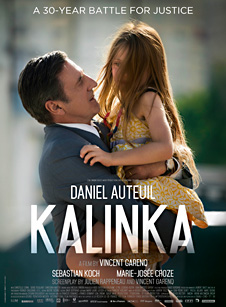KALINKA / Au nom de ma fille
North American Premiere • Drama • France, 2016
DCP • 2.35 • Dolby 5.1 • Color • 87 min
Directed by: Vincent Garenq
Written by: Vincent Garenq, Julien Rappeneau
Cinematography: Renaud Chassaing
Film Editing: Valérie Deseine
Original Score: Nicolas Errera
Produced by: LGM Cinéma SAS, Black Mask Productions
Cast: Daniel Auteuil (André Bamberski), Marie-Josée Croze (Dany), Sébastian Koch (Dieter Krombach)
International Sales: Studio Canal • studiocanal.com
More intimate drama than thriller, Kalinka chronicles one man’s quixotic, 27-year fight for justice in the name of his murdered daughter. Imagine it, your 14-year-old child turns up dead from alleged sunstroke at the house of your ex-wife’s new husband, a German doctor with a history of sexual abuse. Worse, the autopsy report reveals evidence of abuse and mysterious injections, administered both before and after death. The sordid side of André Bamberski’s story has been tabloid fodder for years in France. But questions about what really happened that fateful night take a back seat to Daniel Auteuil’s fierce interpretation of Bamberski’s obsessive determination to bring the case to trial in the face of mounting bureaucratic quagmires and spineless magistrates. As the situation grows more desperate, so do Bamberski’s tactics, and when the doctor’s extradition to France begins to look unlikely, the aggrieved father decides it’s time to play a different, more proactive role.
For documentarian turned fiction filmmaker, Vincent Garenq, justice is more than a subject for a film. Of his four features, three of them are interpretations of court cases. Garenq’s skill lays in his total command of the issues involved in the cases, and in his ability to plum the emotional depths of his everyday heroes, like the family man fighting to prove his innocence in Guilty (COLCOA 2012), or the journalist risking his career to reveal the corruption within a multinational bank in The ClearStream Affair (2014). Garenq is sometimes compared to André Cayatte, whose films, such as Justice is Done (1950), reflected an enduring fascination for the French judicial system. However, Garenq’s approach is less moralizing, designed merely to point out, rather than to point a finger at, institutional dysfunction. Garenq’s co-writer Julien Rappeneau, is also the co-writer of Families, the latest work of director Jean-Paul Rappeneau, screening its U.S. Premiere at COLCOA this year.




